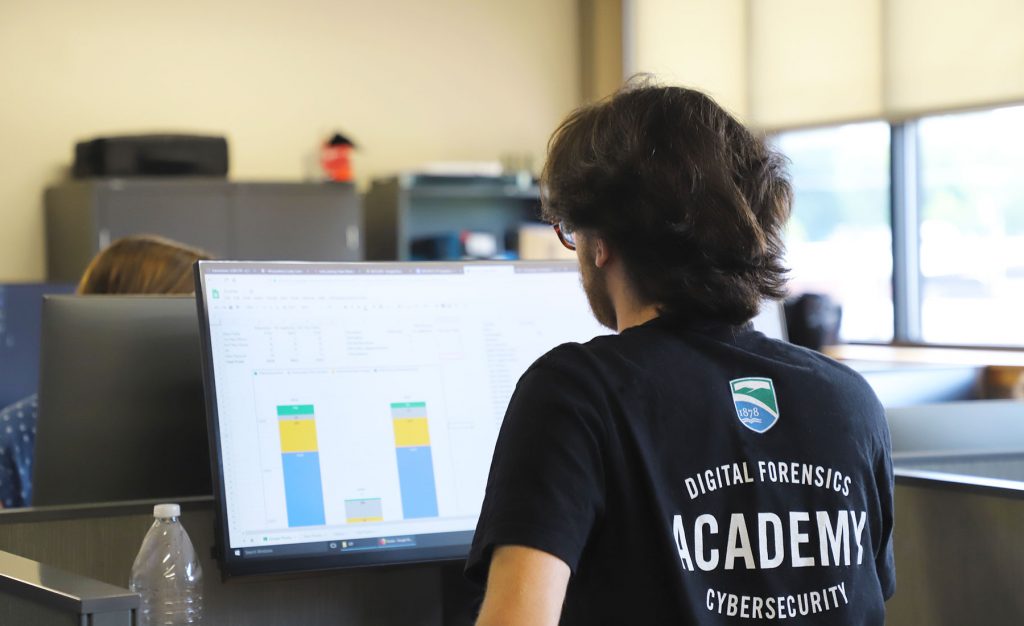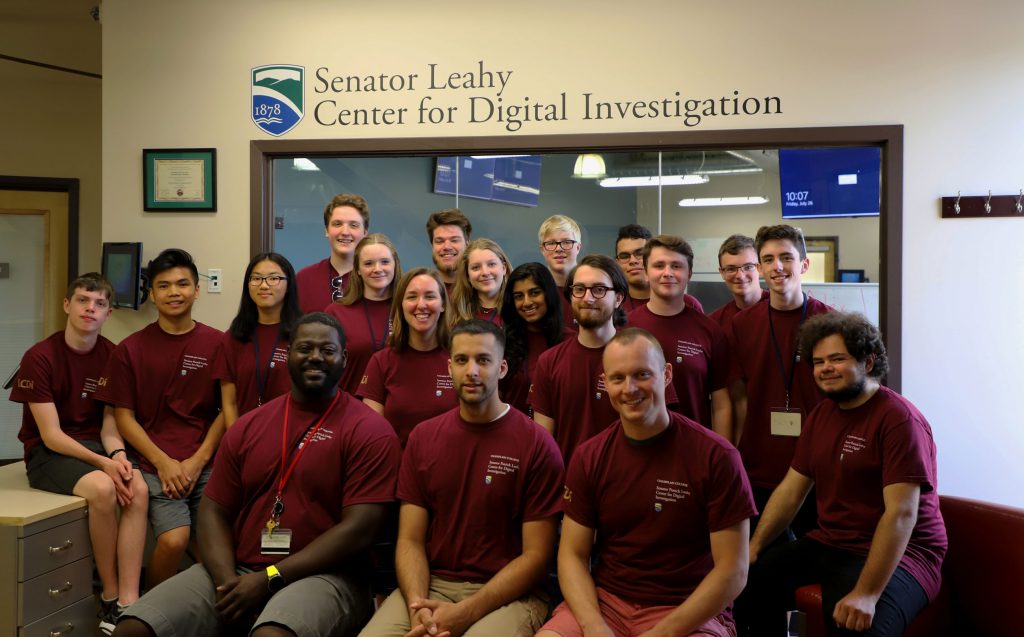What is the difference between cybersecurity and digital forensics? What happens behind the scenes of a credit card fraud investigation? How does digital information security affect our lives and our future? These are the questions that the students at Champlain College’s Digital Forensics & Cybersecurity Academy are here to answer.
“Before coming to this class, I didn’t know that there was a difference,” admits Liam DiFalco, a rising high school senior from Burlington, Vermont. “I thought digital forensics fell under the term of cybersecurity.”
Daisy Kopycienski, another rising senior attending the camp all the way from Denver, Colorado, explains: “Cybersecurity is about defending a system and defending data, and digital forensics is more of an investigation. The attack already occurred and you’re trying to figure out how it happened, who did it, and what information was taken.”


This summer, Liam and Daisy are two of 13 high school students from around the country gathering on the Champlain College campus. They will be learning about industry best practices, ethical hacking, and tools and techniques used by cybersecurity professionals and digital forensics experts surrounding information security and the handling of digital evidence.
The Digital Forensics & Cybersecurity Academy is taught by Champlain professors, who are all professionals in their field, and is held in the Leahy Center for Digital Investigation (LCDI). The LCDI is a state-of-the-art, nationally recognized digital investigation lab that provides expertise to the private sector as well as federal, state, and local law enforcement agencies. The LCDI is the largest student employer on campus, and is the perfect place for students attending the summer camp to get exposure to professional-grade equipment and software.


Daisy has been interested in STEM subjects since middle school, and has recently developed a passion for digital forensics.
“I was trying to figure out if this is what I really want to do and if Champlain is somewhere I’d be interested in going, so I figured that this summer program would be a good way to see if I was serious about this field and this school. So far, I’m impressed.”
While Liam has also been interested in cybersecurity and computer programming for a long time, he’s never found any classes that offered exactly what he was looking for. Until now.
“Personally, I’m learning at such a professional level,” he says. “I’ve learned that cybersecurity is more software oriented, and forensics deals with the intricate details of the hardware and evidence. They’re both cool so I haven’t made up my mind yet about what I want to do.”
Professors approach new topics from the perspectives of cybersecurity as well as digital forensics in order to give students the most exposure to each field. Jon Rajewski, director of the LCDI, teaches his students about the Internet of Things (IOT). They learn how IOT devices are used to store personal data, and how cybersecurity professionals protect them from being exploited by hackers. On the flip side, he shows how digital investigators get into the devices to evaluate any damage done by the hackers.


The two weeks of camp are structured to balance classroom learning and hands-on application of skills in the fields of cybersecurity and digital forensics through real-life crime scenarios and simulations. Eric Jollymore, Detective Sergeant with the Vermont State Police and adjunct Champlain faculty member helps set up the evidence for a credit card fraud scenario.
“The activity is very much set up as a puzzle,” he says. “It’s like a two-week escape room.”


There are multiple parts to this investigation. “The students are learning about search and seizure,” explains Joseph Williams, co-director of the Academy. “We’re teaching them Fourth Amendment rights, interview techniques, and how to write search warrants.”
The students wrote their warrants, interviewed the victim, and searched a van and a classroom that Detective Sergeant Jollymore and Patrolman Josh Otey of the Essex Police set up with evidence. As expected, the activity was a hit.
“We learned how to do it correctly,” says Daisy, whose team began by searching the classroom. “We weren’t just flipping stuff over and going through everything. We would call over the photographer, who would take pictures, and we would write down all the photos we took. It was very interesting to see how that operates in the real world.”


These types of activities allow students to assess and analyze data rather than simply look at the theory. By working with the resources available at the LCDI, the students are exposed to a high level of industry tools in order to gain the skills they need to be successful.
“It looks really complicated on paper,” says Liam, “but once you start getting into it, it’s just punching in the right numbers. Anybody can do it, it just takes time to learn.”


The Digital Forensics & Cybersecurity Academy gives these students a head-start in one of the world’s most rapidly growing job markets before they even get to college. According to the (ISC)² — a leading global cybersecurity organization — there is a worldwide shortage of nearly three million cybersecurity professionals. If high school students can start building their foundational knowledge of the field so early on, they are going to be ideally placed to land a job after graduation.
Daisy explains how the LCDI is a major motivation to attend Champlain College. “My TA told me she got an internship at the beginning of her first year, which I thought was really interesting. In some places it’s hard to get internships until your junior or senior year so it’s good to know that you can get an internship — and then a job right away.”
A summer camp that exposes students to valuable skills they can apply to a promising job market? Hands-on classes paired with bowling and laser tag in the evenings? Access to a professional-grade, world-class laboratory as well as a spectacular view of Lake Champlain and the Adirondacks? It’s all happening here at Champlain’s Digital Forensics & Cybersecurity Academy.


Want to find out more? Visit Champlain College and take a tour of the LCDI to learn more about what kind of work our students get involved with as early as their first year.